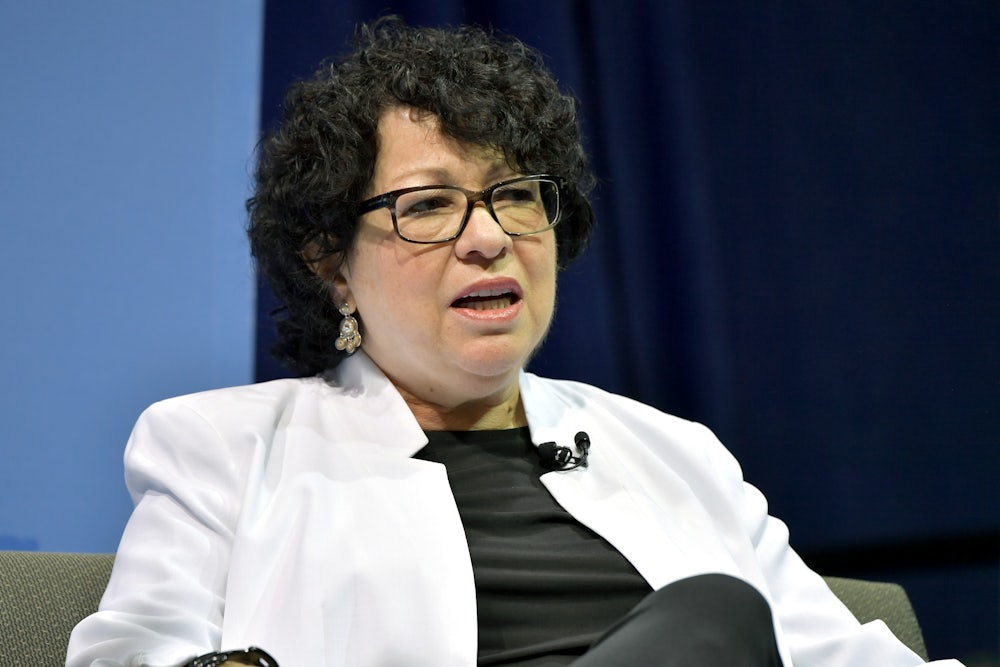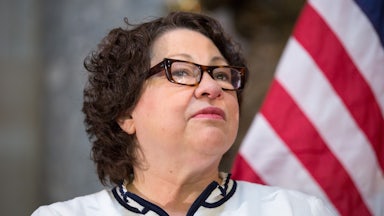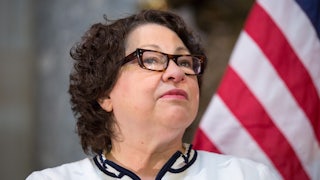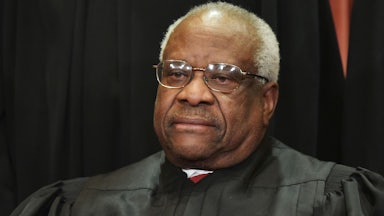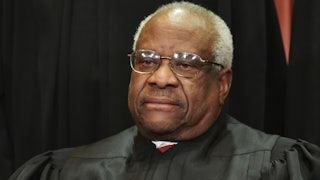Most of the reporting about the Supreme Court justices’ ethical foibles has revolved around its conservative members, namely Justice Clarence Thomas and, to a lesser degree, Justice Samuel Alito. But they aren’t the only members of the court whose conduct has come under scrutiny in recent months.
Earlier this month, the Associated Press reported on a troubling practice by Justice Sonia Sotomayor involving book sales. Sotomayor has written both a biography and children’s books since joining the court. According to the AP, her taxpayer-funded staff has encouraged institutions that invite her to give talks and lectures to buy stockpiles of those books for future resale. Other government employees cannot use official resources in this manner, but the Supreme Court has no ethics code that forbids it.
Mark Paoletta, an influential conservative lawyer and part-time Thomas family spokesperson, also took to Twitter recently to defend his longtime friends by way of criticizing Justice Ruth Bader Ginsburg, who died in 2020. Among other things, Paoletta noted that Ginsburg had taken part in cases involving the law firm where her husband worked prior to his own death in 2010, that she had appeared at events held by partisan or pseudo-partisan organizations, that she had donated a signed copy of one of her opinions to a “pro-abortion” PAC for auction, and that she had traveled to Israel multiple times on planes owned by billionaires with business before the court.
One could be mistaken for thinking that Paoletta brought all of this up to provide a sort of bipartisan reinforcement of the case for ethics reform on the high court. Indeed, it read like persuasive evidence to me. But he apparently offered his opinion in the service of attacking a Democratic-backed ethics bill for the Supreme Court and undermining the larger push for such reforms. “As [Senate Judiciary Committee Democrats] consider [the committee’s] Supreme Court ‘ethics’ bill this week, here’s why Dems don’t care about ethics & are using smears to undermine Court b/c the Left doesn’t like Court’s popular rulings, like affirmative action,” he wrote on Twitter before laying out his points.
That doesn’t really make sense. Evidence of more ethical lapses by the justices, past and present, doesn’t disprove the need for ethics reform. If anything, it makes the need for clearer ethical standards even stronger. Paoletta’s claims underscore the profound cynicism of some legal conservatives as they have tried to defend their friends and allies over the last few months.
For one thing, the surge in reporting and attention on the Supreme Court isn’t really that surprising. As Paoletta himself acknowledges, the high court has gone through some major changes recently. “Since 2020, when the Supreme Court finally had a working majority of justices faithful to the Constitution and no longer interested in acting as a super-legislature imposing progressive policies such as abortion and affirmative action, the Left and its media allies have engaged in a coordinated attack on the court’s credibility and … integrity,” he claimed in a recent National Review column.
I probably would have phrased that a lot differently if I had written it myself. (Anyone who thinks that “the Left and its media allies” could coordinate anything like this isn’t very familiar with the left or the media.) But it’s hard to disagree that the court went through an ideological revolution of sorts over the last half-decade, and its rulings have had a major impact on Americans’ lives. Roe v. Wade is gone, and abortion is now illegal in more than a dozen states. Gun restrictions are far harder to enact, and they may get even harder next term: Among the justices’ upcoming cases is one on whether people under domestic violence restraining orders can possess guns.
Some of the court’s actions have been popular, but they have been outweighed by the unpopular ones in the public consciousness. Every major survey shows that Americans’ confidence in the court has plummeted in the last two years, driven in large part by the perception that the court was wrong to overturn Roe and is moving too far to the right too quickly. When the Supreme Court suddenly takes an outsize role in American life, it is unsurprising that people want to know more about the justices making those decisions, and it naturally follows that reporters will be more curious about them as well. It’s a good reason not to have a closet full of ethical skeletons in the first place.
Why have Thomas’s actions in particular supposedly escaped notice until now? The most obvious answer is that Thomas wasn’t really a leading figure on the court for most of his tenure. This is not to say that his vote didn’t matter or that he didn’t affect the outcomes of cases; he simply wasn’t the court’s ideological leader until recently. Antonin Scalia, by comparison, came under considerable scrutiny in the early 2000s for his refusal to recuse from certain environmental cases after a duck-hunting trip with then–Vice President Dick Cheney.
“A rule that required members of this court to remove themselves from cases in which the official actions of friends were at issue would be utterly disabling,” Scalia wrote in a 21-page memorandum to defend his decision at the time. That position, as well as his willingness to accept free hunting trips and other perks, foreshadowed many of the court’s current ethical woes.
An even better answer is that the Thomases haven’t exactly escaped scrutiny before now. Thomas stopped reporting certain gifts and trips he received after the Los Angeles Times reported on them in 2004. Many news outlets have also commented on the strangeness of Ginni Thomas’s extensive ties to right-wing political organizations, some of which have business before the court or file friend-of-the-court briefs to urge the justices to take specific positions. But that situation didn’t really become a national news story until investigations into the January 6 attacks discovered she had also been pushing for the election results to be overturned in Trump’s favor. In other words, this isn’t as new as Thomas’s defenders think it is.
Another thrust of Paoletta’s argument is that the court’s current critics have overlooked missteps by the court’s liberal justices. This is also untrue. In the summer of 2016, Ginsburg famously criticized Trump as a “faker” and suggested that he could have a damaging effect on the country and the high court if elected. While ultimately true, it was also an extraordinary breach of the court’s neutrality by a sitting justice, and it was treated as such by most observers at the time, including myself.
Ginsburg ultimately did not recuse herself from any subsequent cases involving Trump. To my knowledge, she never explained why she didn’t do so or whether it was even considered. And to my knowledge, neither the Trump administration nor any prominent conservative legal figures seriously demanded that Ginsburg take the impractical step of recusing herself from all cases involving the executive branch for four years. And to the extent that other justices’ missteps are being overlooked, Paoletta hasn’t cited anything that wasn’t first reported by a mainstream news outlet.
One of the advantages of ethics reform for the Supreme Court is that it would affect all justices equally, whether they be liberal or conservative. It would be one thing to question the specific mechanics of ethics reform, as some conservative outlets have done, but it is another thing entirely to dismiss it out of hand—especially while citing examples of ethical lapses by the justices. Paoletta’s cynical approach continued in his National Review column, where he insisted that all of Thomas’s entanglements are just friends being friends.
“Because they can’t actually prove any corruption, [reporters] lob vague accusations of ‘ethics concerns’ or ‘inappropriate access’ at justices in an attempt to muddy the water and convince the American public there’s something nefarious happening behind the scenes when there is not,” Paoletta argued. Since ProPublica hasn’t proven every element of the federal bribery statute, in other words, Thomas has done nothing wrong. But the ethical standard for federal judges is (thankfully) not everything short of indictable corruption. And if the standard for Supreme Court justices is that low, then it should be much, much higher. There’s no evidence that liberal proponents of this higher ethical standard would exclude their ideological cousins from the rules. It makes you wonder why the same can’t be said of the conservative critics who have since entered the discussion.
